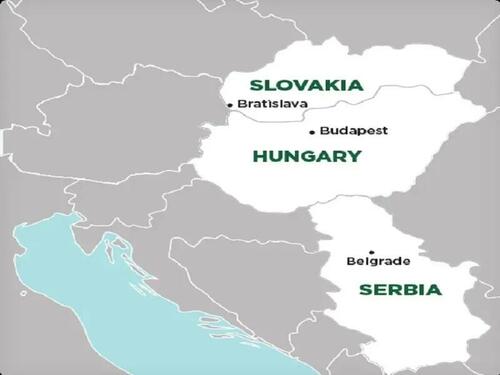Authored by Andrew Korybko via Substack,
Hungarian Foreign Minister Peter Szijjarto warned in a Facebook post last month after talks with his Slovak and Serbian counterparts that Brussels is plotting regime change against them. This comes after Russia’s Foreign Intelligence Service (SVR) reported that the EU and Ukraine are backing the Hungarian opposition ahead of next spring’s parliamentary elections. The larger context is that they’ve all defied EU pressure to cut ties with Russia and are considering the creation of a new regional integration platform.
From the EU’s hegemonic perspective, those three’s current governments do indeed pose “an increasingly serious obstacle to a ‘united Europe’” as SVR described Hungary as being vis-à-vis Brussels, with that country being the main one followed by Slovakia and then Serbia to a much lesser extent. Long-serving Prime Minister Viktor Orban is a populist-nationalist icon on the continent, while his Slovak counterpart Robert Fico only recently returned to office but immediately followed in Orban’s footsteps.
Serbian President Aleksandar Vucic is an altogether different story, however, since he presents himself as a populist-nationalist but in many ways behaves as a liberal-globalist. For instance, SVR recently accused his government of indirectly arming Ukraine, which followed its votes against Russia at the UNGA. He also claims that recurring protests against his rule are a Color Revolution, which Russia has thus far agreed with, yet there’s also no denying that some bonafide populist-nationalists fiercely oppose him.
That’s because of his aforesaid anti-Russian moves, his concessions to the NATO-occupied Autonomous Province of Kosovo and Metohija, and his obsequious attitude towards the EU. At the same time, he also hasn’t fully capitulated to all of the West’s demands either, ergo why some of its ruling liberal-globalists want to depose him. Therefore, while it’s dishonest to describe him as a populist-nationalist in the same vein as Orban or Fico, it’s still true that all three don’t fully tow the EU’s line on Russia.
Circling back to Szijjarto’s recent post after clarifying the situation with Vucic, the EU’s regime change plots against all three are being advanced through a combination of information warfare and support for anti-government (Brussels-organized) “NGOs” (BONGOs). The purpose is to turn voters against the ruling parties (or whichever presidential candidate they endorse like in Vucic’s case after he said that he won’t amend the constitution to run again) so that their leaders can later be “democratically” deposed.
Prior to the next elections as well as in the scenario that this plot fails, infowars and BONGO protests are weaponized to discredit these figures as the pretext for justifying more direct EU pressure against them and their countries. Regardless of whatever form this takes, the end goal of regime change remains the same. It’s simply unacceptable from the EU’s hegemonic perspective for them to oppose Brussels on such important issues as Russia even in non-member Serbia’s case since this undermines its authority.
Looking forward, all eyes will be on Hungary’s spring elections, which will be the first chance for the EU to “democratically depose” one of these three leaders unless Serbia holds early elections before then.
In Serbia’s case, whoever Vucic endorses might take his pro-Western pivot to its conclusion, so it might not matter whether they or the opposition win.
It’s more difficult to predict what’ll happen in Hungary’s case, however, but the ruling party’s loss would be a powerful blow to populist-nationalists in Europe.
Loading recommendations...
